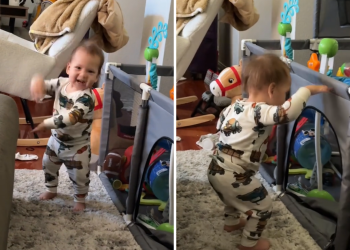ALISON BEARD: Welcome to the HBR IdeaCast from Harvard Business Review. I’m Alison Beard. We all know the stereotypes of leaders who use charisma, manipulation, domineering behavior, or their status in the hierarchy to exert control. But when you think about the people in your organization who actually command the most respect and have true power over their teams, the business and their careers, who comes to mind? Our guest today has spent years studying the second type of leader, people who’ve developed and display personal power that’s not necessarily related to their position on the org chart. He’s investigated what this kind of power is, where it comes from, and how it can enhance our lives. And he’s developed some simple strategies and tools to help us tap into our own personal power. Chris Lipp is a professor at Tulane’s Freeman School of Business and executive coach and author of the new book, The Science of Personal Power. Chris, thanks so much for joining me.
CHRIS LIPP: My pleasure, thank you.
ALISON BEARD: Let’s start by defining personal power. What exactly is it and how does it relate to formal power hierarchies or status in the workplace?
CHRIS LIPP: Personal power is our belief in our own capability to create impact. And this is why I think it’s such an interesting topic is a lot of books, sometimes it feels like it’s very Machiavellian where you need to practice certain behaviors that don’t make you feel good on the inside as they’re getting you success on the outside. On the flip side, you’ve got all these self-help books and a lot of great literature on developing ourselves, but they don’t necessarily lead to results on the outside. And it just makes sense that why shouldn’t psychology be evolved, that what makes us successful on the outside is also what makes us feel good on the inside. And personal power really plays into that. So it’s behavior is that when you have a greater belief in yourself, in your capacity to create impact, you naturally radiate these qualities outward and people take these signals and then give you more respect as a result.
ALISON BEARD: Okay. So let’s dig into what you’ve learned so far about where personal power comes from and how you can cultivate it.
CHRIS LIPP: Personal power really has three foundations. It’s a sense of control, a sense of agency, or what I say is an internal orientation towards ourselves, responding to inner signals versus external signals, and then a focus on action. And when you look at those who act courageous, for example, those who are whistleblowers, they tend to exude these exact three qualities. And so a lot of what I write about in the book in how you can capture your own personal power, tap into it, is really through these three vehicles.
ALISON BEARD: And so if it starts inside each of us with feeling in control, internally oriented, focused on action, how do we get there on all three of those counts? Especially if we feel like we’re coming from a relatively powerless place and don’t necessarily have a lot of autonomy at work, for example.
CHRIS LIPP: Sense of control, for example, is taking responsibility over the environment. And you’re right, in lower positions within a formal hierarchy, for example, we have less control. It’s just the environment. However, those who feel a greater sense of personal power tend to see things, even if they’re not in control, objectively tend to say, “Oh yeah, I do have some impact on this”. In some way, they see the angle through which they have control. Or they simply see their control over their own ability to respond to the situation. For example, their control over their emotions. Control is a very big important one, but one that I really want to share and I think this is super powerful, is today there are a lot of people who feel unmotivated at work and they feel disempowered. And how do I get out of an environment that’s already disempowering me into an environment where I’ll feel more empowered? Well, the way to get into those environments, for example, the way to go up the hierarchy is to tap your personal power. The research is super clear that many of the behaviors that you radiate outward when you step into your power are behaviors that people see as more leaderly, they’re more likely to promote you to management leadership positions as a result. Okay, so then how do we do it right when we’re disempowered?
ALISON BEARD: Right.
CHRIS LIPP: Researchers have found very simple way to do it is not to affirm your capability, but to affirm your values. When you affirm your values, a couple of things happen. Number one, it focuses you internally on what’s important to you. So you begin to experience that agency again. Number two is it reframes your perspective into the bigger picture. Naturally, when people begin to think more abstractly, that’s associated with greater personal power versus more concretely, which is associated with less personal power. So what they found is if you go, for example, 20 minutes before an interview, if you sit down and you write out from a list of values, you pick your top values, and then for four to five minutes you write about why this one value is important to your life, not necessarily to the job but to your life. Doing nothing else, no interview skills, no better resume. Doing nothing else, if you affirm that value for four minutes, when you walk into the interview you’re almost twice as likely to get the job.
ALISON BEARD: And it’s just because you’re focused on yourself, your own strengths, your own beliefs, and that comes out when you’re speaking to the other person?
CHRIS LIPP: When you are tapped into yourself and you have that big picture perspective, people subconsciously evaluate you as a more effective leader, for example. And so they’re more likely, for example, in an organization, they’re more likely to promote you. But in an interview, they’re more likely to see, wow, this person will bring a lot of value to the organization.
ALISON BEARD: And so you talk also about the importance of giving as a way to build and exhibit personal power. And I totally get that piece of why delivering value to others is important. It’s sort of that’s how you build trust, it’s how you build credibility, it’s how you persuade people you’re competent, but how do you make sure that you translate that into actual power rather than just being the workhorse?
CHRIS LIPP: Personal power really has two dimensions when we look at behaviors and the communication. Number one is, of course, giving. And we know this. I mean, every organizational book will tell you to add value to your organization and the importance of that which is critical. It actually is critical. In fact, hierarchies are based around your value add, not necessarily your dominance. But people pleasers don’t rule the world, right?
ALISON BEARD: Right.
CHRIS LIPP: Because if a person has power over their environment and we see that, then we know that they can actually act in service to us. Whereas somebody who’s powerless, even if they’re all for us and everything, they’re just powerless. And so they can’t influence, they can’t add value to the organization. And well, what happens then? Okay, so I had this happen to a colleague. She was negotiating for a job and they made her an offer that was significantly under market. And so she confided in me, she’s like, “With this salary, it’s going to be a real struggle to take care my family.” But at the same time, she was very nervous and very scared of pushing back because she felt, what if they don’t like me? What if they rescind the offer? And fear is one of the hallmarks of the low power mindset or more specifically reacting to fear. And so I told her, “You’ve got to push back”, but she didn’t and she ended up accepting the low offer. Now, it’s kind of a mistaken belief to think that if you push back, people will like you less. What the research actually suggests is powerful people are focused on fairness and when others observe you wanting fair treatment, people will give you more power. They will perceive you to have more power. So by pushing back on an offer, particularly under market, and asking for a more fair compensation, what you do is you exhibit more personal power which makes you more valuable, which then in the mind of the interviewer makes them more justified in giving you what you want.
ALISON BEARD: Right. That’s a virtuous circle. So that push and pull, sort of the giving but then the also taking or self-assertion is very important, getting that balance right. And being assertive is what we expect from powerful people. But how do you make sure that you do it in a way that isn’t off-putting, especially when you don’t have a lot of formal power or, as you described with your friend, you’re coming from a demographic group that might be penalized for assertiveness, for example, you’re a woman or a person of color.
CHRIS LIPP: It really comes back to are you displaying a sense of control? Are you displaying an internal orientation and a focus on action? So we are creating value for our organization. Now, let’s say you’re giving a presentation and the CEO interrupts you, asks some random errant question that tries to pull the whole meeting off-topic and you’re stuck because here’s the thing, you need to get this meeting through. It’s very important for the company, which ultimately is going to be important for the CEO. And if you fail this, it’s going to reflect back on you. So do you respond to the CEO? Do you continue to focus on the meeting? So in the story I share in the book, she turned to the CEO and she said, “That’s a really great question. Let’s finish this meeting first in order to get the regulatory approval we need to move the product forward.” She was very clear and deliberate in the value that would bring to the organization. And then she said, afterwards, I can catch you up, give you a full detail on what’s going on there with his question. So if you’re going to, for example, change the agenda, or I don’t want to say resist the CEO, but not necessarily follow external influence, you need to still show that well, you’re internally oriented because you understand the greater goals for the organization and you want to communicate that the reason you’re doing that is for the greater goals of the organization and the CEO.
ALISON BEARD: And you mentioned reflecting on values as a way to ground your own internal orientation, your focus on action, the feeling of control. Are there any other exercises that you recommend to prime yourself for personal power?
CHRIS LIPP: Research has given us so many great exercises. Oprah Winfrey, she said, “Whenever I walked into a room, a bunch of old white men”, she said, “I would remind myself that I was not alone. I was not the sole black woman walking into that room, that there were dozens of strong women behind me walking with me.” And it points to research that suggests before you go into a high-stakes situation where you know will be a minority, what you can do is you can affirm another group you belong to and the values of that group. So let’s say that you belong to a religious organization or a sports organization or a hobby, any group that is meaningful to your identity, affirm that group, affirm the values of that group, very similar to what we did before with self-values. And then walking into that meeting, the stereotype threat won’t hit you the same.
A third you can do is you can reflect on a previous time that you had personal power. Previous time maybe where you were in control of the situation and you were making decisions or you were evaluating others, for example, if you’re an interviewer, it will activate the constellation of processes in your mind that are associated with your personal power. And when you step into that meeting, you will be stepping in with your power. So we haven’t mentioned this, but if I were to simplify powerful person from a powerless person as simple as I could make it, I would say that powerful people are focused on their own goals. Powerless people are focused on the approval of others. And so that’s why reaction, right, when we react, when we defend ourselves, we’re trying to show we care about their approval or we care about our external approval or when we submit or all of these things. When we’re focused on our own goals, how do we behave? Well, we look at the environment and assess the environment to see what’s in service to our goals. So back to your question, one way you can feel powerful is if you get this attack at you, present, breath, and then curiosity. Reach out and begin to ask questions to understand the situation better.
ALISON BEARD: And you have seen people shift from powerless to powerful doing all of these things?
CHRIS LIPP: It’s incredible. I mean, a much more relatable situation is the bad boss who just criticizes all your work and gives you a bad performance review. So when you’re in these situations, what they did in the research, is if you come in with being open to the input from the other, when you’re present and curious, you step out of the powerlessness which breaks the behavioral confirmation that would confirm you actually are bad. And then by asking questions and showing this curiosity, the other person will say, hey, this person’s open to learning. Actually that means they’re open to change, so maybe they can be better, like the boss who’s giving you a performance review. So it’s amazing. What I love about personal power is it coincides so well. What is personally powerful for you as a person emanates outward and people see that and they respond in so many positive ways that will move your career and your life forward.
ALISON BEARD: Is it fair to say that personal power needs to be exercised differently in different contexts at work? If you’re dealing with a boss versus an employee or in small groups versus large ones.
CHRIS LIPP: The foundations of personal power are the same, the expressions of personal power may differ on the situation. And so that’s why in the book, I address both the theory and the application with a lot of different examples to ensure that people understand, okay, well this is the root sense of control and responsibility, internal orientation and action. Now here’s this unique situation, how do these pillars apply? And so yes, you’re absolutely right.
ALISON BEARD: And you have already shared some great stories, but let’s talk about some of the famous examples in the book from the business world, the Roone Arledge, Bob Iger, one from very early in Bob Iger’s media career before he became CEO of Disney, was one that really stuck with me because it was counterintuitive.
CHRIS LIPP: You wonder how these people, for example, Bob Iger, how do these guys go from being at the very bottom of the hierarchy to the tip-top, right? CEO of Disney today. And I was very curious about this. This actually was part of what led into my exploration of personal power. And so this situation you’re mentioning. Back at ABC Sports, Roone Arledge was head of ABC Sports. I think this is back in the ’70s when Bob Iger was just basically a kid. Roone Arledge was the inventor of Monday Night Football, big mogul in sports broadcasting. He invented instant replay and these things. But ABC Sports missed a world record event in the mile. So Monday morning, he has an all hands meeting and he walks into that room and he just starts shouting, everybody’s really embarrassed and nobody’s making eye contact. And we all know that there’s this idiom in business, which is in order to get ahead, you want to associate yourself with wins and distance yourself from failures. And so Roone Arledge, he looks at everybody and he’s like, “Whose fault is this?” And the whole room is just silent. And Bob Iger then from the very back, he raises his hand and he’s like, “Yeah, that was me.” Roone just stared at him. And then the conversation moved on. And the way Bob Iger tells the story, he says, “Every time I saw Roone in the hallway he treated me differently, with more respect.”
ALISON BEARD: So he gained power by admitting his mistake.
CHRIS LIPP: A sense of control is part of what’s power. So imagine this. If by taking responsibility, what you communicate implicitly is that you have control over the situation. Now you might’ve made a mistake, but it’s within your power to correct. Whereas if you blame or if you do not take responsibility, blaming is often the way we do it, what we’re communicating implicitly to the audience is I had no control over that situation. There’s been a lot of research on this. And when managers see others, including other managers, take responsibility, they see them as more trustworthy, they see them as more likable, more respected. And when other people do not take responsibility, they were less likable, less respected, less managerial.
ALISON BEARD: And you also talked about Andy Grove, Steve Jobs, and Bill Gates in their heydays. All very domineering leaders, but also very successful at getting the best from their people. I think because as you explained, it was in service to this sort of greater ambition or goal. One pushback on that would be to say, well, those guys were geniuses. They were at the top of their field. Does that really work for everyone?
CHRIS LIPP: Nelson Mandela spent 30 years in prison and became the president of South Africa. So to suggest that these people had something special and unique. I mean, you could say Nelson Mandela had something special about him, but he did. And what he had special was his personal power. A lot of people point to privilege, maybe Steve Jobs had that. But no, it wasn’t because he was a founder or anything, he just had power and that’s what made him powerful. Was he a genius? I know a lot of geniuses, and I’m sure you do too, who don’t get a lot of recognition. They don’t get respect. As a listener, you might know that you have really intelligent ideas but nobody takes you seriously. This is actually my own story. And I studied engineering at UC Berkeley, and when I got out into the engineering world, of course, I had been at this university where everything was brain. I was just thinking, thinking. And so then I get into the business world and suddenly people aren’t listening to me, right? This is why I wrote two books on persuasion before Power. Because I thought, well, persuasion must be the vehicle for me to really make my voice heard. Which of course, persuasion is such a powerful tool. But it’s also more than that. If you are in an environment where you are communicating disempowerment, no matter how persuasive you are people just won’t take you seriously. Powerless words are powerless no matter how persuasive they are. So ultimately, back to your question, what about intelligence? I don’t think the research supports that. If you were to look at all the intelligent people in the world, I think you would find very little correlation between their ability to rise to the top versus others.
ALISON BEARD: Let’s talk a bit more about meetings, because that is where power dynamics often show up in a work group. Are there any other tips that you have for how to show up in a more powerful way, whether you’re the person leading the meeting or the least senior person there?
CHRIS LIPP: There’s some great research that shows the different status levels within meetings, low status, medium, and high. And low status is really focused on being liked, being accepted and getting a sense of belonging within the group. And the way that this tends to take the extreme version is you got the joker or the clown, and then you’ve got… And there’s nothing wrong with telling jokes and stuff, I do that all the time, but it’s like, if that’s your role, that’s not so good. Or if you’re taking menial tasks like getting coffee. Any of these roles that are stereotypical, I want to belong to the group so I’m going to show how much I care about everybody or whatnot, it’s kind of a low status role. Medium status role really focuses on adding value. So that’s discussing problems, offering solutions, these things, very powerful, right? Medium status is not a place of disempowerment, it’s a good place. But they found that people on the highest status, they added value but they also did something different, which is they also guided the flow of the conversation itself. So they weren’t just a cog in the machine, they were actually directing the efforts of the machine. And mostly the one way that we tend to think about that stereotypically is literally like, let’s go to the next agenda item. What’s the next item? And then address the item, get feedback from the group. So let’s say for example, that you’re not the expert in the room. Okay. So how can you contribute in a meeting where you’re not the expert but it’s full of other experts? And I actually got this advice from Maggie Neal over at Stanford, so Stanford faculty in the graduate school of business there. And she said one of the most impactful things you can do in that situation is to moderate the meeting. You begin to take control of the flow of the conversation, not in service to yourself. That kind of person who’s like, look at me, but actually the moderator is almost the opposite. The moderator is like, what do you think? What do you think? What do you think? And then they take all these, they might ideas, they write it on a whiteboard, they synthesize it for the group, and then they offer maybe that synthesize back. And that role is very valuable to the group. So if you’re in that situation where you aren’t the expert, or you’re not quite sure how to contribute, or you just want more status, see how you can moderate the meeting, not just contribute to it.
ALISON BEARD: Yeah. And it also shows curiosity, right? And you’re empowering others because you’re asking their opinions. So I think as a journalist, I’ve always found that I’m most successful in conversations when I’m steering them, but only by asking other people questions.
CHRIS LIPP: Absolutely. In the book, I write about this concept, what I call the spotlight principle. And when we think about, for example, who has more power and you put a spotlight down. Is it the person in the spotlight or the person in the darkness who has the most power? And of course, the person in the darkness doesn’t really have any power. So everybody says, “Oh, it’s the person in the spotlight.” That’s actually not. The person who has the most power in a room, is the person controlling the spotlight.
ALISON BEARD: So what if you are managing someone who you think has a lot of potential, but is really struggling to develop these personal power skills? How can you help as a boss?
CHRIS LIPP: Well, you could, for example, give them more autonomy. But a few things. One is it behooves leaders to share goals with their subordinates, their employees, not to micromanage and necessarily give all the concrete details. But in doing that without giving the specifics, it gives the employees agency to come up with the best solutions for achieving that goal. Number two, hold your employees accountable. I think a lot of times people are hesitant to hold others accountable because they worry that it’ll negatively impact the relationship. But research suggests that, of course, naturally, because we ourselves have a sense of control over the environment, that we take responsibility and we project this outward expecting others to take responsibility. And so when you hold others accountable, of course there are effective ways and ineffective ways to do this, but when you hold others accountable, it helps them break the illusion of their own powerlessness.
And the third thing I’ll leave you with on this is sometimes you give an employee a task, for example, but the employee runs into barriers with other employees. Nobody listens to that employee, and I give an example of this in the book, what you can do as a manager to empower your employee is not… What happens sometimes is because your employee is not being taken seriously, everybody else goes to you for the answers. Even though they should be going to employee, they go to you for the answers, right? And if you were to give them the answers, you’re actually disempowering your employee because you are reconfirming a different sort of hierarchy. So an empowered manager who empowers others would say, “Hey, you need to go to this person who’s working for me. I’ve put this person in charge of that, talk to them.”
ALISON BEARD: Well, terrific. Chris, thank you so much for all this advice about how to show up more powerfully at work and in life and to help others do so.
CHRIS LIPP: My pleasure.
ALISON BEARD: That’s Chris Lipp. He’s a professor and the director of management communication at Tulane University’s Freeman School of Business. He’s also the author of three books on persuasion, including his most recent, The Science of Personal Power. And we have over 1,000 episodes and more podcasts To help you manage your team, your organization, and your career. Find them at hbr.org/podcasts or search HBR in Apple Podcasts, Spotify, or wherever you listen. Thanks to our team. Senior producers, Mary Dooe and Anne Saini, associate producer Hannah Bates, audio product manager, Ian Fox and Senior production specialist Rob Eckhardt. And thank you for listening to the HBR IdeaCast. We’ll be back with our next episode on Tuesday. I’m Alison Beard.




















